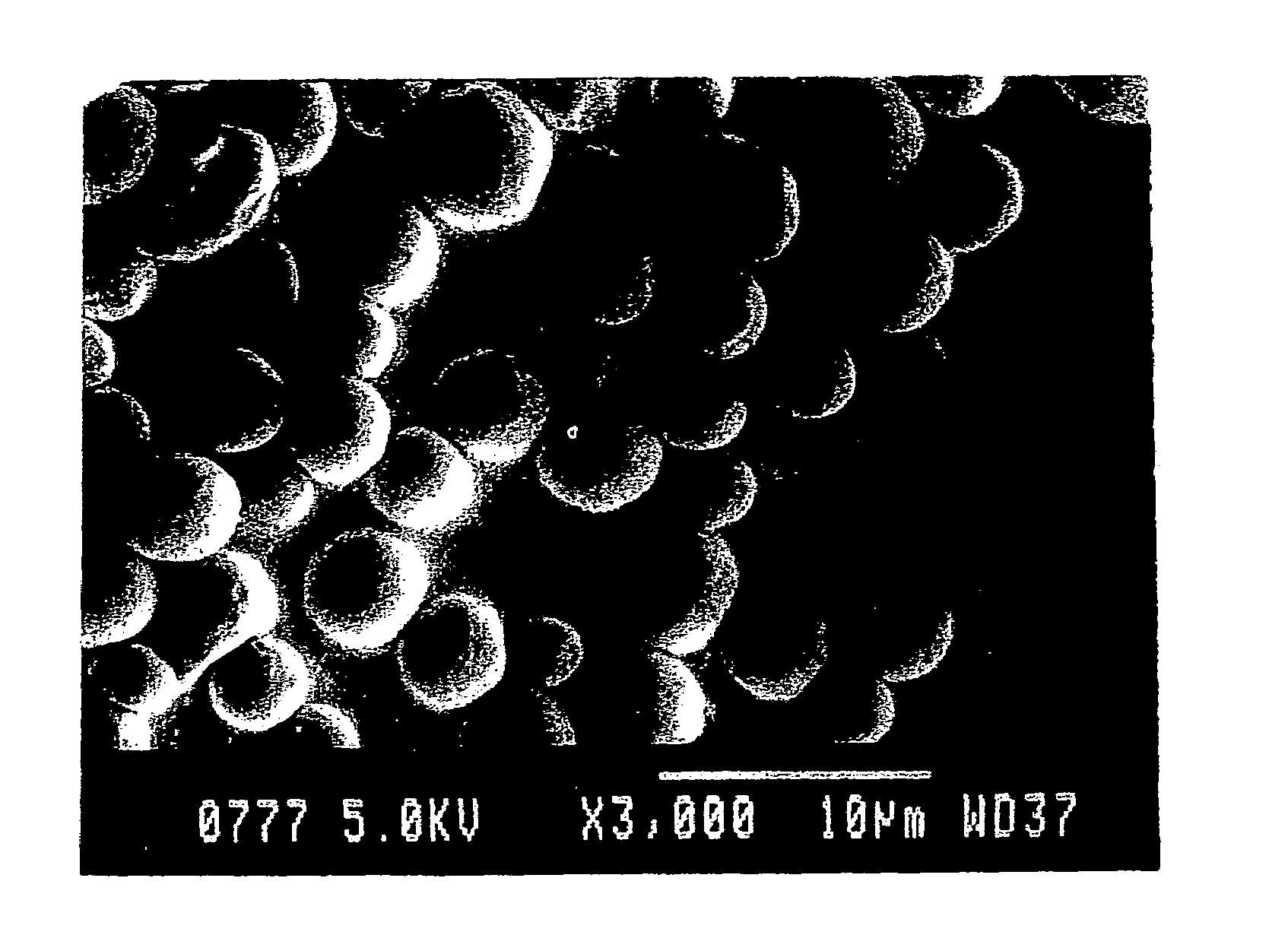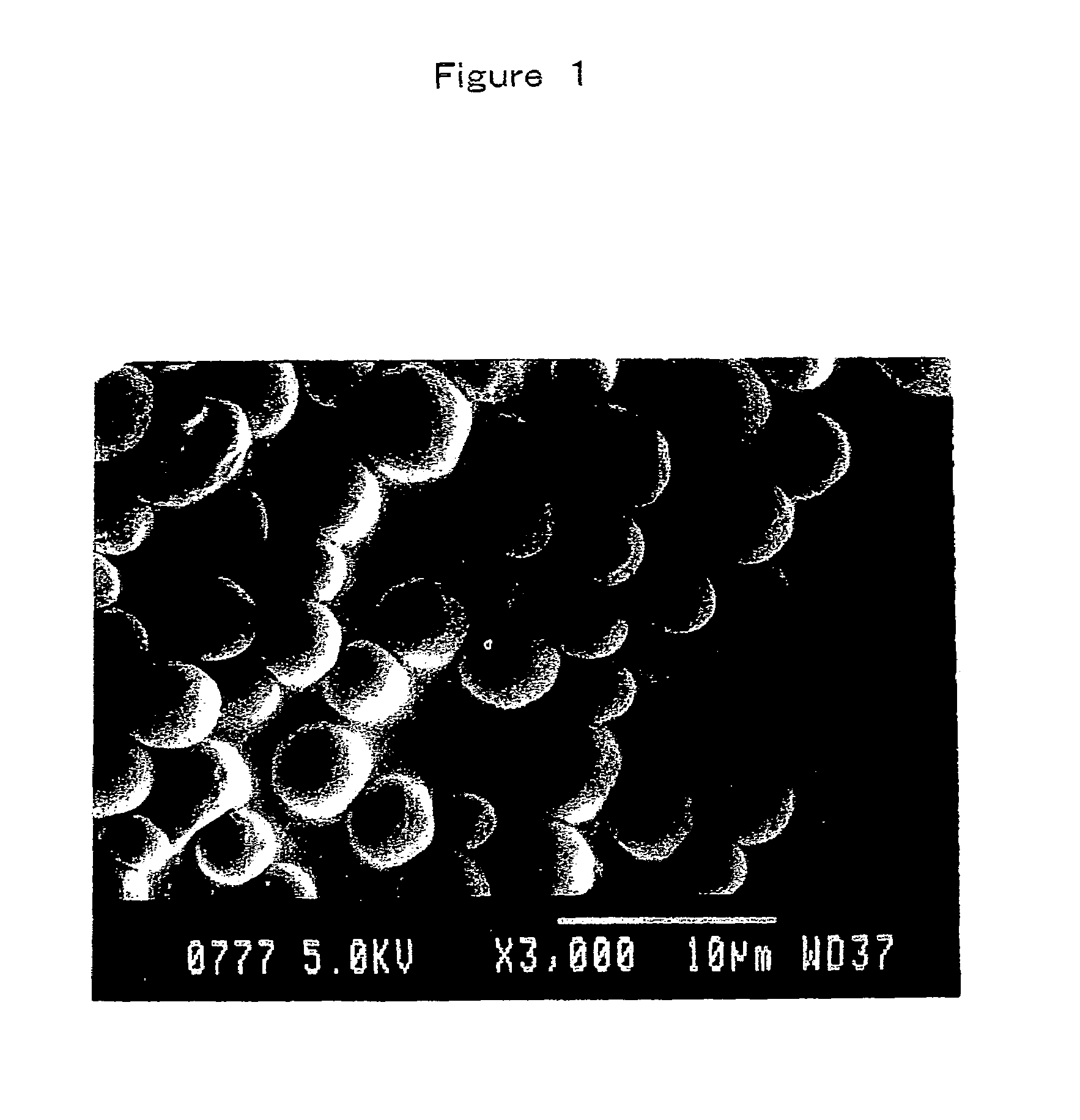Composition having disperse system, and process for producing colored organic solid particle
a disperse system and organic solid particle technology, applied in the field of colored organic solid particle, can solve the problems of inability to obtain spherical particles by mechanical pulverization (or crushing) methods, high manufacturing cost, and inability to use polymer particles in size, etc., to achieve high affinity, enhance efficiency, and utilize coloring agents
Inactive Publication Date: 2008-10-28
DAICEL CHEM IND LTD
View PDF58 Cites 4 Cited by
- Summary
- Abstract
- Description
- Claims
- Application Information
AI Technical Summary
Benefits of technology
The method efficiently produces colored polymer particles with uniform size and spherical shape, reducing waste and production costs while minimizing environmental burden.
Problems solved by technology
In such a method, however, manufacturing machines are expensive, and additionally, thus obtained particle is irregular in shape and widely varies in particle size.
However, unusable polymer particles in size are produced in large quantities by classification, and are unfavorable from an economical viewpoint.
Further, spherical fine particles are preferred from the viewpoint of blocking among particles, dispersibility, flowability or others, however, it is impossible to obtain spherical particles by mechanical pulverization (or crushing) methods.
In this process, however, the steps are complicated and a high temperature of the insoluble medium is required for dissolving the thermoplastic resin in the making step of the droplet-like particle.
Therefore, the kind of the insoluble medium is limited to an organic solvent having a high boiling point.
Moreover, in order to avoid fusing between the droplets in the cooling step, it is necessary to cool down to about 0° C., and it is impossible to stably obtain particles having a uniform particle size.
In this process, however, since the additive (such as a pigment or a dye) is also distributed to the resin (b) constituting the continuous phase, the additive such as a pigment cannot be effectively utilized as an agent for imparting a function to a resin and has an economical disadvantage.
Therefore, not only the combination of these resins but also that of the resins and the solvent are limited to a specific one.
Further, in the process of cooling the disperse composition, since resins immiscible with each other tend to induce a large phase separation, a fine particle having a given shape cannot be obtained due to reaggregation of once produced dispersed phase.
However, recovery of the resin in the solution not only is very difficult but also is a caused factor of increase in the production cost of the polymer particle.
Method used
the structure of the environmentally friendly knitted fabric provided by the present invention; figure 2 Flow chart of the yarn wrapping machine for environmentally friendly knitted fabrics and storage devices; image 3 Is the parameter map of the yarn covering machine
View moreImage
Smart Image Click on the blue labels to locate them in the text.
Smart ImageViewing Examples
Examples
Experimental program
Comparison scheme
Effect test
examples
[0159]The following examples are intended to describe this invention in further detail and should by no means be interpreted as defining the scope of the invention.
the structure of the environmentally friendly knitted fabric provided by the present invention; figure 2 Flow chart of the yarn wrapping machine for environmentally friendly knitted fabrics and storage devices; image 3 Is the parameter map of the yarn covering machine
Login to View More PUM
| Property | Measurement | Unit |
|---|---|---|
| particle size | aaaaa | aaaaa |
| temperature | aaaaa | aaaaa |
| viscosity | aaaaa | aaaaa |
Login to View More
Abstract
A colored particle (e.g., a spherical particle) comprising an organic solid component (e.g., a polymer component) and a coloring agent (e.g., an oil-soluble dye, and an organic or inorganic pigment) is produced by eluting a water-soluble auxiliary component comprising at least an oligosaccharide from a composition having a disperse system, in which a particulate dispersed phase comprising the organic solid component and the coloring agent is dispersed in a matrix comprising the auxiliary component. The weight ratio of the polymer component relative to the auxiliary component may be about 55 / 45 to 1 / 99. The proportion of the coloring agent may be about 0.001 to 100 parts by weight relative to 100 parts by weight of the organic solid component. Such a process ensures conveniently and industrially advantageous production of a colored particle (e.g., a colored polymer particle) corresponding to the dispersed phase independently of affinity between the dispersed phase and the matrix.
Description
TECHNICAL FIELD[0001]The present invention relates to a colored organic solid particle (e.g., a polymer particle) useful for a cosmetic, an image recording material (such as an ink or a colored particle) used for an ink jet printer or other means, a paint and varnish such as a powdered paint, and a coloring agent for a print ink, and a process for producing the particle, as well as a composition having a disperse system, which is useful for producing the organic solid particle.BACKGROUND ART[0002]Heretofore, as a process for obtaining a colored fine particle of a thermoplastic resin, a mechanical pulverization (or crushing) method has been utilized, which comprises, for example, coarsely crushing a colored polymer composition obtained by melt-kneading a coloring component and a polymer by using a crushing machine or other means, then pulverizing the crushed matter finely by using a jet mill or other means, and classifying the resultant by an air classifier or other means.[0003]In su...
Claims
the structure of the environmentally friendly knitted fabric provided by the present invention; figure 2 Flow chart of the yarn wrapping machine for environmentally friendly knitted fabrics and storage devices; image 3 Is the parameter map of the yarn covering machine
Login to View More Application Information
Patent Timeline
 Login to View More
Login to View More Patent Type & Authority Patents(United States)
IPC IPC(8): C08L3/00C08K5/00C09J103/00D21H19/54C09J105/00C09J101/00C08L5/00C09D101/00C09D103/00C09D105/00C08L89/00C08L1/00C08J3/12C08J3/20
CPCC08J3/12C08J3/201C08K5/0041C08J2325/08C08L5/00C08L101/00
Inventor ITO, HISAYOSHI
Owner DAICEL CHEM IND LTD
Features
- R&D
- Intellectual Property
- Life Sciences
- Materials
- Tech Scout
Why Patsnap Eureka
- Unparalleled Data Quality
- Higher Quality Content
- 60% Fewer Hallucinations
Social media
Patsnap Eureka Blog
Learn More Browse by: Latest US Patents, China's latest patents, Technical Efficacy Thesaurus, Application Domain, Technology Topic, Popular Technical Reports.
© 2025 PatSnap. All rights reserved.Legal|Privacy policy|Modern Slavery Act Transparency Statement|Sitemap|About US| Contact US: help@patsnap.com


